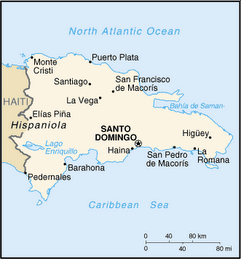Madame Kim Bolduc, a representative of the UN, said "People expect Haiti to be better this time around. With the amount of solidarity Haiti has received from all over the world, we will do better this time". (Haiti Globe)
This is a partial list of the solidarity that is coming to Haiti:(from Financial Edge)
U.S. $100 million, rescue teams, Coast Guard assistance, port assistance, medical ships
Guyana $1 million
Norway $17.5 million, also set up a Red Cross hospital
Trinidad and Tobago $1 million
Australia $10 million
Britain $10 million, 71 rescue specialists
South Korea $1 million
Finland $1.8 million
The European Union will donate $135 million for government buildings and schools (this is only a third of what they will be donating).
Brazil will help Haiti develop a hydro-electric power project.
Costa Rica and Dominican Republic have offered to help reforest Haiti. (El Nacional)
Irish telecommunication company Digicel will donate $5 million to repair the phone network.
On the health front, there have been 11 confirmed cases of malaria among emergency medical personnel (Haiti Star). There are more cases expected with the rains that are coming regularly since last week. There have also been several cases of leptospirosos, a rare and severe bacterial infection. (Haiti Globe) This disease is generally thought to be caused by rat urine or feces in food. The rains will also facilitate the spread of this disease.
Now that it is raining, the rains will run through the rubble still remaining throughout the city. In this rubble there are still many decomposing bodies. The flow of rain will carry this contaminated water through the streets of the camps. The sanitary and health problems seem insurmountable. Rains weren't expected to begin this soon, the heavy showers of last weekend soaked many and caused 13 deaths.
Tents were purchased this week from China. People need tents but Charles Clermont, Presidential Counsel for Housing Commission says there isn't enough free room to set up another 200,000 tents in Port au Prince. Many are also saying that the tents are too expensive for a temporary solution: too hot when the sun shines and not enough protection when it rains, and only a temporary solution. Most of the families currently using tents will need housing for 3-5 years. At $100 - $150 per tent, Clermont suggests using these funds to purchase shelter kits instead. Each kit comes with sheets of tin, posts and other building materials.
Another complication caused by the tents is the fire hazard they pose. Since there is no electricity, people are cooking on open fires outside their tents and using wax candles for light at night. (Le Nouvelliste)
Homes that are still standing are being inspected to insure that they are safe for people to move back in. But with the earthquake of last week (4.7), people are more afraid than ever to live under any kind of cement or brick roof. Many who were inside their homes have decided to sleep outside because of safety concerns.
March 5, 2010
Subscribe to:
Post Comments (Atom)






No comments:
Post a Comment